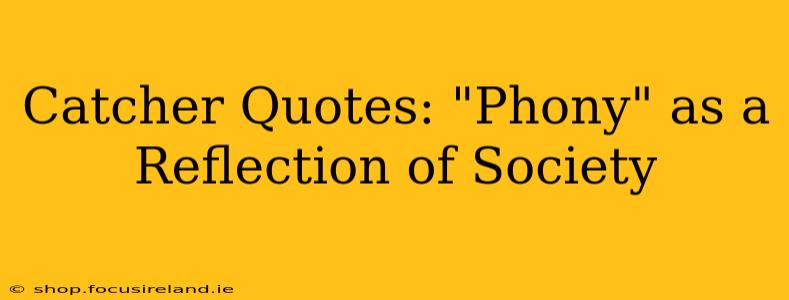J.D. Salinger's The Catcher in the Rye isn't just a coming-of-age story; it's a scathing critique of societal hypocrisy and the alienation of youth. Central to this critique is Holden Caulfield's repeated use of the word "phony," a term that encapsulates his disgust with the adult world's perceived superficiality and lack of authenticity. Holden's repeated use of "phony" offers a powerful lens through which to examine the societal pressures and expectations that contribute to feelings of isolation and disillusionment, particularly for adolescents navigating the complexities of identity and belonging.
What Does "Phony" Mean in The Catcher in the Rye?
Before diving into Holden's societal critique, it's crucial to understand his definition of "phony." For Holden, "phony" isn't merely a synonym for fake or insincere. It represents a deeper moral failing: a lack of genuine connection, a disregard for authenticity, and a prioritization of superficial appearances over genuine human interaction. He sees "phoniness" in the adults around him, those who seem to prioritize social climbing, wealth, and status over genuine human connection. This isn't simply teenage rebellion; it's a sharp observation of a society that often values conformity over individuality.
How Does Holden's Use of "Phony" Reflect Societal Pressures?
Holden's labeling of people and situations as "phony" highlights several societal pressures:
-
Conformity: Holden rails against the pressure to conform to societal expectations. He sees his peers blindly following trends and social norms, sacrificing their individuality for acceptance. This pressure to conform is a significant source of his disillusionment. He observes this conformity in the adults around him, particularly those in positions of authority like his teachers and parents, who he feels embody this superficial conformity.
-
Materialism: The emphasis on material possessions and social status deeply disturbs Holden. He views the pursuit of wealth and status as a distraction from genuine human connection and self-discovery. He sees this materialism as another facet of "phoniness," a superficial pursuit that masks a lack of genuine values.
-
Superficial Relationships: Holden's frustration stems from the shallowness of many of the relationships he witnesses and experiences. The adults in his life seem more interested in maintaining appearances than nurturing genuine connections, leading him to feel isolated and misunderstood. He longs for genuine intimacy but is disheartened by the superficial interactions he encounters.
Is Holden Himself "Phony"?
Interestingly, Holden's own behavior often contradicts his condemnation of "phoniness." His cynicism and judgmental attitude can be seen as forms of superficiality, especially his own tendency towards alienation and emotional detachment. This internal conflict adds complexity to his character and challenges the reader to question the absoluteness of his judgments. His own struggles with honesty and self-reflection make him a more relatable and ultimately more compelling character.
Why Does Holden Use "Phony" So Frequently?
Holden's frequent use of "phony" serves multiple purposes:
-
Emphasis: It underlines the depth of his disgust and disillusionment with the adult world and its perceived hypocrisies.
-
Defense Mechanism: The constant labeling allows him to distance himself emotionally from a world that he finds deeply unsettling. It's a shield against vulnerability.
-
Expression of Alienation: His repeated use of the word reflects his profound sense of isolation and his difficulty connecting with others on a meaningful level.
What are the Lasting Implications of Holden's Critique?
Holden's critique of "phoniness" remains relevant today. His observations about conformity, materialism, and the superficiality of relationships continue to resonate with readers who grapple with similar anxieties and disillusionments. His story serves as a reminder to question societal norms, to prioritize authenticity, and to strive for genuine human connection in a world that often prioritizes appearances over substance. The enduring power of The Catcher in the Rye lies in its ability to challenge readers to examine their own values and to confront the complexities of navigating a world often perceived as shallow and insincere.

